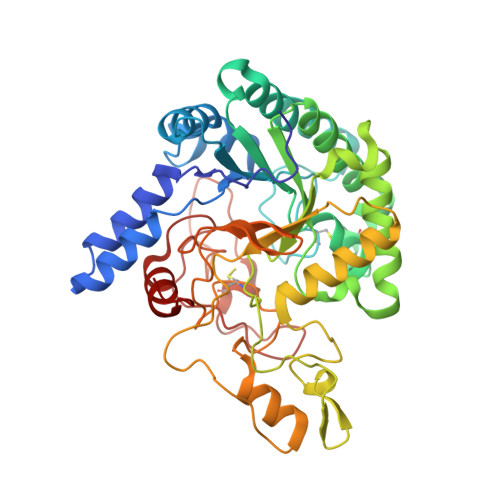A mutation in an exoglucanase of Xanthomonas oryzae pv. oryzae, which confers an endo mode of activity, affects bacterial virulence, but not the induction of immune responses, in rice
Tayi, L., Kumar, S., Nathawat, R., Haque, A.S., Maku, R.V., Patel, H.K., Sankaranarayanan, R., Sonti, R.V.(2018) Mol Plant Pathol 19: 1364-1376
- PubMed: 28976110
- DOI: https://doi.org/10.1111/mpp.12620
- Primary Citation of Related Structures:
5XYH - PubMed Abstract:
Xanthomonas oryzae pv. oryzae (Xoo) causes bacterial blight, a serious disease of rice. Xoo secretes a repertoire of cell wall-degrading enzymes, including cellulases, xylanases and pectinases, to degrade various polysaccharide components of the rice cell wall. A secreted Xoo cellulase, CbsA, is not only a key virulence factor of Xoo, but is also a potent inducer of innate immune responses of rice. In this study, we solved the crystal structure of the catalytic domain of the CbsA protein to a resolution of 1.86 Å. The core structure of CbsA shows a central distorted TIM barrel made up of eight β strands with N- and C-terminal loops enclosing the active site, which is a characteristic structural feature of an exoglucanase. The aspartic acid at the 131st position of CbsA was predicted to be important for catalysis and was therefore mutated to alanine to study its role in the catalysis and biological functions of CbsA. Intriguingly, the D131A CbsA mutant protein displayed the enzymatic activity of a typical endoglucanase. D131A CbsA was as proficient as wild-type (Wt) CbsA in inducing rice immune responses, but was deficient in virulence-promoting activity. This indicates that the specific exoglucanase activity of the Wt CbsA protein is required for this protein to promote the growth of Xoo in rice.
Organizational Affiliation:
CSIR-Centre for Cellular and Molecular Biology, Hyderabad 500007, India.














